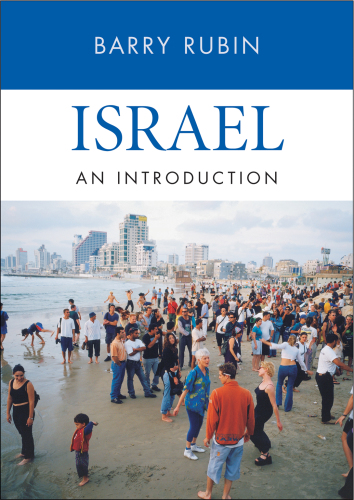
Israel
An Introduction
- اطلاعات
- نقد و بررسی
- دیدگاه کاربران
نقد و بررسی

February 27, 2012
Noted Middle East scholar Rubin (coauthor, Hating America: A History) divides this overview of Israel into seven categories, offering in-depth perspectives with encyclopedic breadth on the makeup of the Jewish state, focusing only briefly on Israel's struggle for self-preservation. The section "History" provides a masterful summary of Israel's past from its socialist beginnings before independence to the modern struggles with the Iranian regime. "Land and People" gives a thorough summary of the country's demographics, while "Society" and "Government and Politics" offer streamlined narratives of Israeli society's dialectic between religious and secular identity and the political struggles dealing with the nation's often crippling and "ever-active self-criticism." Of particular note is the "Culture" section, which reveals the rich and increasingly influential art, literature, film, and music that Israelis are producing, such as the Golden Globe-winning animated film Waltz with Bashir. The text shies away from some of Israel's more controversial actions, such as the bulldozing of Palestinian properties during the Second Intifada. The book's stated goals are to present a portrait of the complex strata of Israeli society without focusing on the Israeli-Palestinian conflict, while also dispelling the often "artificially manufactured myths and rewritings of history" that have made the country controversial. Rubin has focused on the fabric of Israeli society instead of the controversy that surrounds it . Illus.

January 1, 2012
A thorough, occasionally defensive overview of the young nation from inception to the present by an accomplished Israeli lobbyist and scholar. The director of the Global Research in International Affairs Center at the Interdisciplinary Center, Herzliya, Israel, which sponsors this project, Rubin (The Truth About Syria, 2008, etc.) has marshaled many contributors in this fairly evenhanded survey of the many rich and complex facets of Israeli history, society, government, economics and culture. He establishes immediately that "a great deal about Israel is controversial," and confronts the issues in a straightforward manner. Such issues include existential insecurity, ongoing Palestinian conflict, fluid borders, diverse immigrant population, living with daily terrorist violence and the sense of being "misunderstood by outside observers." He reminds readers that Jews even in exile acted as a "national people, arguably the first such in history," and thus the establishment of Israel was "the continuation of a long historical process," not merely the result of the Holocaust. The early socialist framework of the kibbutz and moshav, created around farming communities by immigrants with little capital or modern resources, continued well until the 1990s, forming a mostly secular, pluralist, democratic society; today Israel's economy is driven by technological innovation, while Rubin downplays the country's vast military strength, insisting that "Israel has never been a militarized country." The author writes that Israelis want peace and are willing to give up territory captured in the 1967 war and grant a Palestinian state, but are not convinced that the Palestinians are reliable partners. Rubin's delineation of the numerous political parties is elucidating, and he concludes with an overview of cultural tenets. A sound, basic survey without a rigid agenda, useful for students, tourists and those planning aliyah.
(COPYRIGHT (2012) KIRKUS REVIEWS/NIELSEN BUSINESS MEDIA, INC. ALL RIGHTS RESERVED.)




دیدگاه کاربران